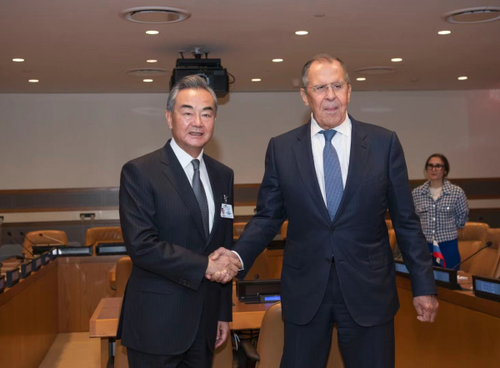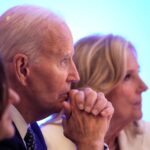
China has laid out what it says is its most authoritative statement on the Ukraine war, after recent weeks have seen state officials and media pundits assert positions which marked varying degrees of justifying the Russian invasion, and condemning NATO expansion.
"Sovereignty and territorial integrity of all countries should be respected, principles of the UN Charter should be followed, legitimate security concerns of all parties should be taken seriously, and all efforts to resolve the crisis peacefully should be supported," China’s Foreign Minister Wang Yi outlined in a meeting with Ukraine's Foreign Minister Dmytro Kuleba in New York on the sidelines of the UN General Assembly this week.
Chinese state media revealed the comments on Friday, and according to Wang, "Those four objectives are China’s most authoritative statement on the Ukrainian issue and also China’s fundamental approach to this issue," Bloomberg reports.

This follows what appeared to be rare public criticisms of Russian President Vladimir Putin coming from China and India at the Uzbekistan security summit a week ago.
"Indian prime minister Narendra Modi’s chiding of Vladimir Putin and the Russian leader’s acknowledgment of concerns raised by Chinese president Xi Jinping last week were signs of discomfort with Moscow, three western officials said," FT reported.
Modi had told Putin directly that now "is not a time for war." While some pundits said the West was "cherry picking" these comments and exaggerating their importance, the FT underscored that:
The remarks, at a summit in Uzbekistan, came days after a Ukrainian attack forced Russia’s army to surrender more than 3,000 sq km of territory. The comments were "a genuine and clear signal" of annoyance, one senior European official said, adding that India and China could adjust their actions towards both Russia and the west. A senior European minister told the Financial Times they interpreted the comments as "actual criticism".
In the opening months, China either kept mum altogether when pressed to condemn Russia's invasion of Ukraine, or else suggested Moscow's security interests were legitimate. Washington had even accused China of providing military equipment resupplies to Moscow - a charge which was never backed by evidence.
Wang told the UNGA meeting at the end of this week, "We must strive for the parties to resume negotiations without any preconditions" - in the clearest indicator thus far that China is now pushing for the resumption of dialogue, but both warring sides appear further than ever from the negotiating table at this point.
Meanwhile, in the first direct interaction since Nancy Pelosi's ultra-provocative August 2nd-3rd visit to Taiwan...
Chinese diplomats are generally a force in Chinese society to actively safeguard China-US relations. US diplomats are more of a force pushing American society to destroy China-US relations. pic.twitter.com/plMTZmGH95
— Hu Xijin 胡锡进 (@HuXijin_GT) September 23, 2022
China has laid out what it says is its most authoritative statement on the Ukraine war, after recent weeks have seen state officials and media pundits assert positions which marked varying degrees of justifying the Russian invasion, and condemning NATO expansion.
“Sovereignty and territorial integrity of all countries should be respected, principles of the UN Charter should be followed, legitimate security concerns of all parties should be taken seriously, and all efforts to resolve the crisis peacefully should be supported,” China’s Foreign Minister Wang Yi outlined in a meeting with Ukraine’s Foreign Minister Dmytro Kuleba in New York on the sidelines of the UN General Assembly this week.
Chinese state media revealed the comments on Friday, and according to Wang, “Those four objectives are China’s most authoritative statement on the Ukrainian issue and also China’s fundamental approach to this issue,” Bloomberg reports.

This follows what appeared to be rare public criticisms of Russian President Vladimir Putin coming from China and India at the Uzbekistan security summit a week ago.
“Indian prime minister Narendra Modi’s chiding of Vladimir Putin and the Russian leader’s acknowledgment of concerns raised by Chinese president Xi Jinping last week were signs of discomfort with Moscow, three western officials said,” FT reported.
Modi had told Putin directly that now “is not a time for war.” While some pundits said the West was “cherry picking” these comments and exaggerating their importance, the FT underscored that:
The remarks, at a summit in Uzbekistan, came days after a Ukrainian attack forced Russia’s army to surrender more than 3,000 sq km of territory. The comments were “a genuine and clear signal” of annoyance, one senior European official said, adding that India and China could adjust their actions towards both Russia and the west. A senior European minister told the Financial Times they interpreted the comments as “actual criticism”.
In the opening months, China either kept mum altogether when pressed to condemn Russia’s invasion of Ukraine, or else suggested Moscow’s security interests were legitimate. Washington had even accused China of providing military equipment resupplies to Moscow – a charge which was never backed by evidence.
Wang told the UNGA meeting at the end of this week, “We must strive for the parties to resume negotiations without any preconditions” – in the clearest indicator thus far that China is now pushing for the resumption of dialogue, but both warring sides appear further than ever from the negotiating table at this point.
Meanwhile, in the first direct interaction since Nancy Pelosi’s ultra-provocative August 2nd-3rd visit to Taiwan…
Chinese diplomats are generally a force in Chinese society to actively safeguard China-US relations. US diplomats are more of a force pushing American society to destroy China-US relations. pic.twitter.com/plMTZmGH95
— Hu Xijin 胡锡进 (@HuXijin_GT) September 23, 2022





